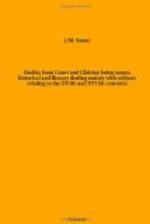V. JESUITS AT COURT
Lacordaire once wrote in a letter to Madame Swetchine these remarkable words concerning the disciples of St. Ignatius:
“Tout ce qui m’a tombe sous la main m’a toujours revolte par l’emphase ridicule de l’eloge, ou par l’impudeur du blame. II semble que cette nature d’hommes ait toujours ote la raison a ses amis et a ses ennemis. Je voudrais leur consacrer dix annees d’etudes, ne fut ce que pour mon plaisir propre; mais Dieu nous donne et nous prepare une bien autre besogne, et il faut dire avec l’auteur de l’Imitation, ’relinque curiosa.’ Les Jesuites continueront a faire du bien, et a le faire mal quelquefois; ils auront des amis frenetiques et des ennemis furieux, en attendant le jour du jugement dernier, qui sera pour bien des raisons un tres-interessant et tres-curieux jour.”
At no time has the world been more occupied with the Jesuits than at the present moment, and the prophecy of the celebrated Dominican above quoted seems more than ever likely to be fulfilled. If their friends are indeed still as extravagant in their praise as Lacordaire found them, perhaps on the other hand criticism is even louder, hatred more profound, accusation more wild and general. Most of the governments of Europe have banished them, on the ground that they are the enemies to progress, to liberal ideas, that they have meddled in politics, and constitute a danger to the State, by seeking to grasp the helm of public affairs, secretly stirring up the nations against their rulers.
The subject appears to be of perennial and universal application, since even in this twentieth century, and in so tolerant a country as England, people have been moved to some apprehension lest we should be incurring a danger in suffering the Jesuit to live unmolested in our midst. But it is not our present ambition to settle so burning a question as the right of members of the Society of Jesus to exist anywhere; rather would we make an excursion into the domain of history, and inquire what have been the rules and regulations, and what has been the practice of the Society concerning politics in the past, what has been the attitude of its members, prescribed and actual towards kings, potentates, and dynasties.
Certain facts have recently come to light, bearing on the history of the Jesuits at the various German courts in the sixteenth century, and the scattered remains of the private correspondence belonging to the archives of the old Society before its suppression have been gathered together. What was done more or less in secret is now proclaimed on the housetops, and the result, as might be expected, is in many ways interesting and instructive.*
* Die Jesuiten an den deutschen Furstenhofen des 16ten Jahrhunderts. Auf Grund ungedruckter Quellen. Von Bernhard Duhr, S. J., Freiburg im Breisgau, 1901.
This correspondence consists of communications between the rank and file, and the superiors at Rome, and vice versa, and includes the letters which passed between the General and the kings, archdukes and other reigning princes, who were ostensibly friends of the Society, but who did their best to put frequent spokes in the wheels of the Constitutions.




